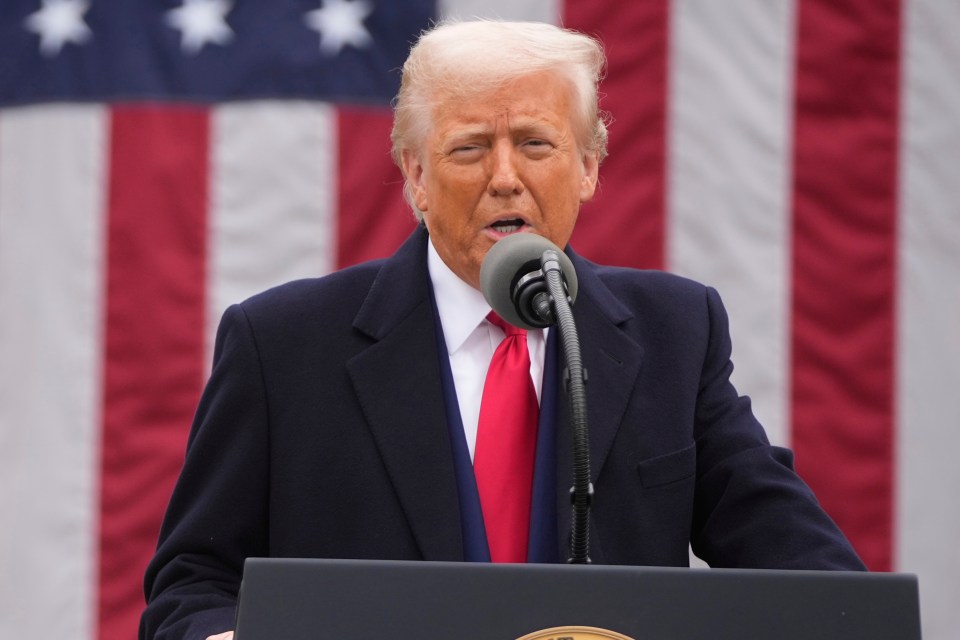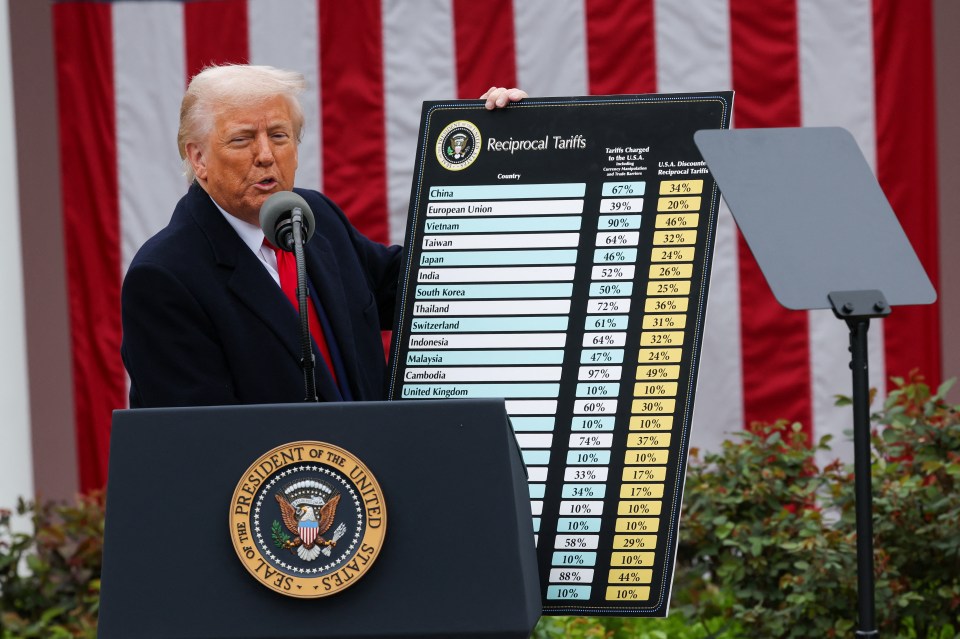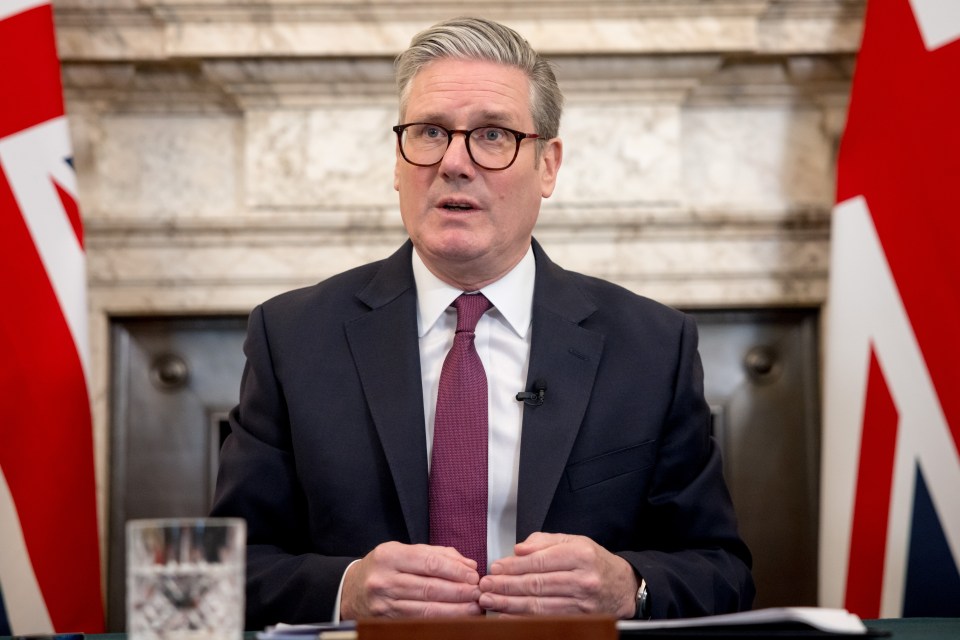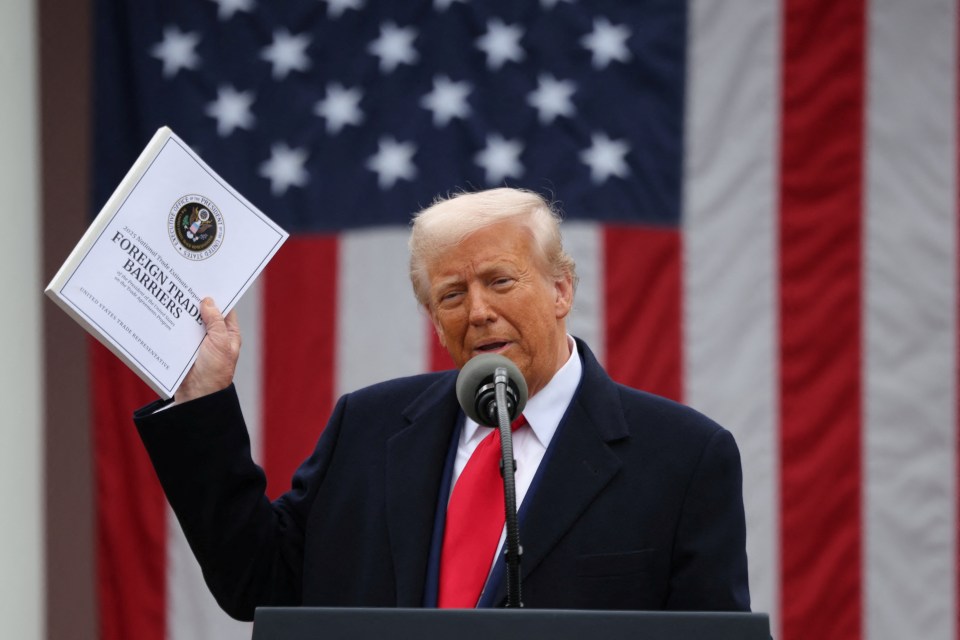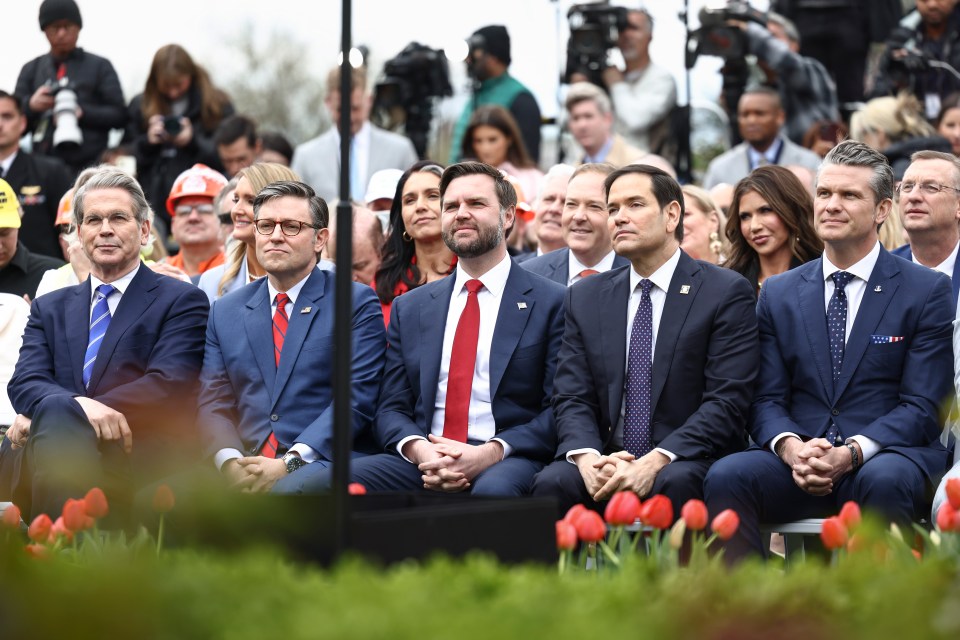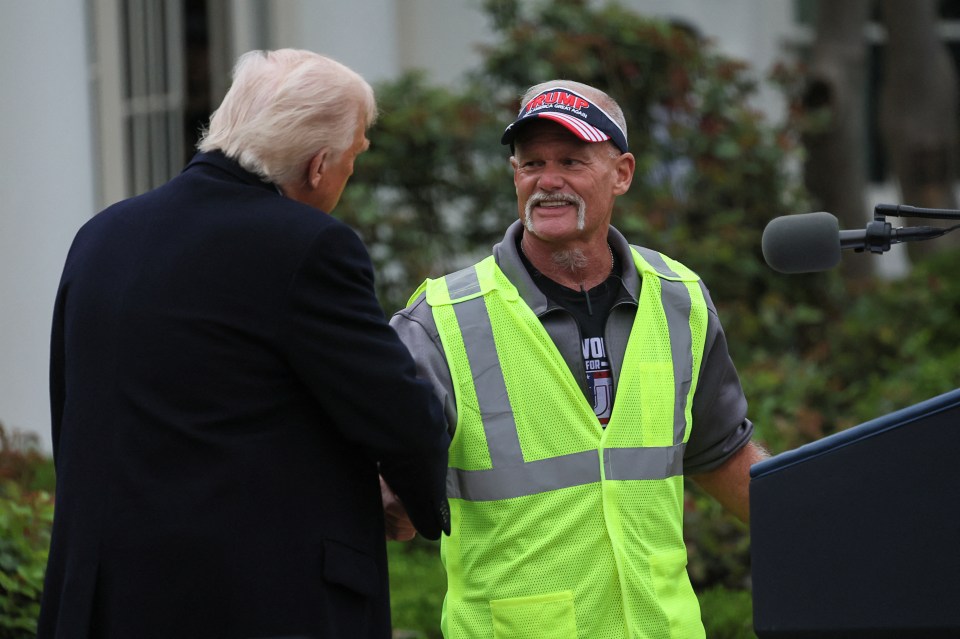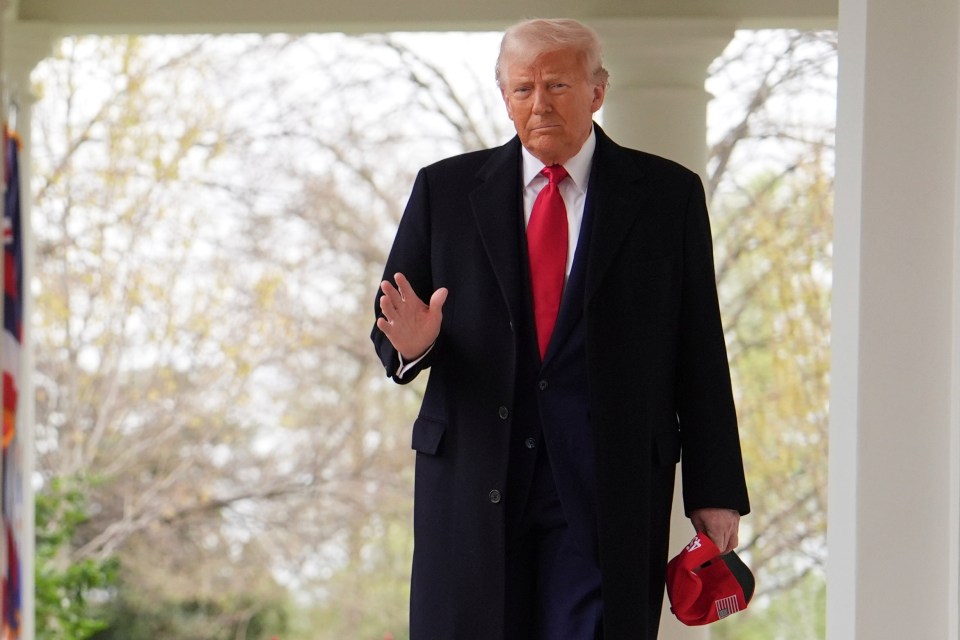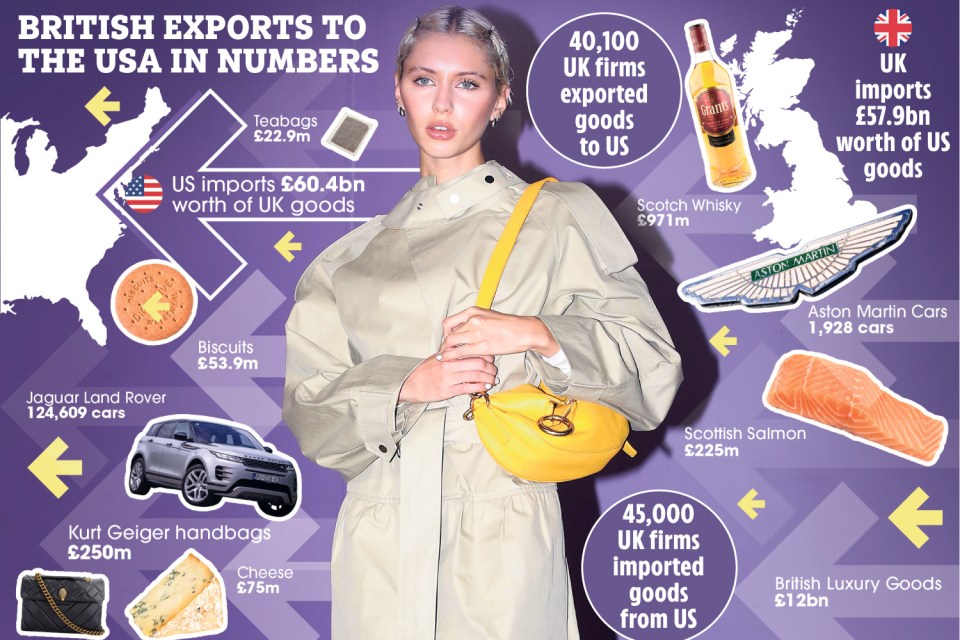BREXIT was today hailed for letting Britain escape the worst of Donald Trump’s tariff blizzard and saving thousands of jobs.
The 10 per cent levy slapped on all UK imports into America was still branded a “disappointment” by ministers that will hurt our economy.
But it is still half the 20 per cent tax imposed on the European Union, which last night promised to retaliate in a full-blown trade war.
Trump aide Sebastian Gorka said: “After Brexit, you’ve reaffirmed your independence, and I think that is being proven today by the special rate that has been afforded to the UK.”
Tory Shadow Cabinet Minister Andrew Griffith added: “Our Brexit freedoms have saved us from the worst.”
Business Secretary Jonathan Reynolds admitted it was a benefit the UK can “set our own trade policy in our own interest”.
He was locked in talks with his US counterparts last night and will update MPs on the UK’s response this morning.
While “disappointed” with Mr Trump’s tariffs on Britain, he vowed to ignore the “siren calls” from people demanding the UK hits back with our own levies.
He said the UK “reserved the right” to retaliate but that a tit-for-tat response would only worsen our economy.
Downing Street has said the difference between 10 and 20 per cent tariffs was “the difference between thousands of jobs” and vindicated their “cool heads” approach.
Speaking from the White House Rose Garden last night, President Trump vowed to sign a “historic executive order” instituting reciprocal tariffs on countries “throughout the world”.
He then held up a board showing rates he was about to set individual trading partners.
China was clobbered with 34 per cent tariffs, Vietnam 46 per cent, Thailand 36 per cent and Cambodia 49 per cent.
The ten per cent on Britain was at the bottom of the sliding scale devised by Mr Trump’s officials.
Trump was cheered on by a crowd of US workers as he unveiled his levies, declaring the “golden age” was coming back to his country.
The President said: “Reciprocal. That means they do it to us and we do it to them.
It comes as…
- Donald Trump unleashed sweeping reciprocal tariffs on all nations on Wednesday
- The president said he would slap levies on major trade partners with universal 10% ‘baseline’
- Specific rates will apply to ‘worst offenders’
- The UK faces the minimum tariff rate at 10%
- The EU, meanwhile, faces a 20 per cent hit on border tax
- 25 per cent tariffs will be slapped on all foreign-made automobiles from midnight ET
“Very simple. Can’t get any simpler than that.”
Trump also announced 25 per cent tariffs on all foreign-made automobiles heading into the country, including those from the UK.
Opponents fear the announcement could now trigger a ferocious response from the worst-hit nations — starting a global trade war.
Officials in Whitehall were nervously waiting on the full details of the tariffs as they seek a trade deal with Washington DC to mitigate the surcharges.
A Downing Street source said: “We don’t want any tariffs at all, but a lower levy than others vindicates our approach.
“It matters because the difference between ten per cent and 20 per cent is thousands of jobs. We will keep negotiating, keep cool and keep calm.
“We want to negotiate a sustainable trade deal, and of course to get tariffs lowered. Tomorrow we will continue with that work.”
Tariff hit causing mixed feelings in government
By JACK ELSOM, Chief Political Correspondent
BRITAIN’S 10 per cent tariff hit is causing mixed feelings in the upper echelons of government today.
Yes, it was the lowest levy doled out by Donald Trump and far below that imposed on many other countries.
But it will still hurt the UK economy, whack our exporters and likely cost scores of jobs.
And what of this charm offensive Sir Keir Starmer has attempted to get in the US President’s good books?
Downing Street was quick to trumpet this approach – and the refusal to retaliate – as “vindication” we have escaped lightly from the tariff blizzard.
Yet many other countries have also been given the 10 per cent levy, including Brazil which has put in far less legwork with the White House than our government.
Ministers will be desperate now to sign this fabled economic deal in the hope it will do away with tariffs entirely.
One thing is undeniable: being outside the European Union has spared us being doubly worse off.
The 20 per cent tariff slung around the Brussels bloc would have been our fate should Brexit had not happened.
EU chief Ursula Von der Leyen has vowed to retaliate – which would have dragged us into a trade war with our closest ally if we were still a member.
It’s not a pretty situation, but t could be a whole lot worse…
Mr Trump, who spoke for nearly an hour, later signed an executive order having delivered his speech and said the reciprocal tariffs would “make America wealthy again”.
He added that yesterday was “the day America’s destiny was reclaimed and the day we began to make America wealthy again”.
He said: “For decades, our country has been looted, pillaged and plundered by nations near and far, both friend and foe.”
The President went on to single out overseas countries who had taken advantage of American car workers, farmers and tradesmen who have lost out.
He also blamed former presidents and leaders who let the situation get out of control.
A trade war is in nobody’s interests and the country deserves — and we will take — a calm, pragmatic approach.
Keir Starmer
Mr Trump said: “They watched in anguish as foreign leaders have stolen our jobs.
“Foreign leaders have ransacked our factories, and foreign scavengers have torn apart our once beautiful American dream.”
Speaking from a lectern with a backdrop of US stars and stripes flags, the President rattled off a string of trade imbalances he said had punished American workers for decades.
His Vice President JD Vance was also in attendance alongside his senior Cabinet team at the “Make America Wealthy Again” event.
Trump pointed out that the US charges just 2.4 per cent on imported motorcycles, while countries like Thailand, India and Vietnam slap on tariffs as high as 75 per cent.
And he said America had only been charging a 2.5 per cent tariff on foreign-made cars, while the EU levies more than ten per cent plus steep VAT rates.
The announcement came after PM Sir Keir Starmer visited the Oval Office at the end of February where they discussed an economic deal.
Meanwhile, Lord Sugar has warned against retaliating by saying any measures “wouldn’t touch the sides”.
The Apprentice host told LBC Radio: “I don’t know what negotiation we can have with this man.”
He added that “it’s no good battling with him or arguing with him”.
It also comes after Sir Keir appeared to make a last-ditch plea for Britain to be spared the tariffs plan.
‘CALM & PRAGMATIC APPROACH’
The PM said: “A trade war is in nobody’s interests and the country deserves — and we will take — a calm, pragmatic approach.
“That’s why constructive talks are progressing to agree a wider economic prosperity deal with the US.
“That’s why we’re working with all industries and sectors likely to be impacted.
“Our decisions will always be guided by our national interest, and that’s why we have prepared for all eventualities — and we will rule nothing out.”
Britain could also become a destination for imports diverted from the US due to the high cost — which could flood the UK market and hit domestic producers.
But Chancellor Rachel Reeves warned that Britain would not be “out of the woods” even if a trade deal could be secured.
Speaking to the Treasury Select Committee earlier yesterday, she said: “We don’t want to be posturing here. The prize on offer is a good economic agreement between us and the United States.
“We are not going to do anything to put that in jeopardy. We are not going to rush into action to get a quick headline.”
Prime Minister’s plans after tariff blow
The Prime Minister is set to speak to business leaders while the Trade Secretary will look to calm markets on Thursday after Donald Trump slapped a 10% tariff on US imports of UK goods.
Downing Street suggested they had been vindicated in their approach to negotiating with the US in the hope of securing an exemption.
No immediate retaliatory measures are expected from Westminster, as officials continue to focus on securing an economic deal with their counterparts in Washington.
Sir Keir Starmer is expected to meet with businesses on Thursday, after warnings that the changes will be a “blow” to UK firms.
The 25% levy on cars had been expected, but the 10% rate on other goods was lower than had been expected, with fears that it could have been set at 20% to mirror VAT.
The Conservatives described the tariff announcement as “disappointing news” that will “worry working families”, but suggested that Brexit had spared the UK from a higher rate of taxes.
Shadow trade secretary Andrew Griffith said: “The silver lining is that Brexit, which Labour ministers voted against no less than 48 times, means that we face far lower tariffs than the EU.
“A Brexit dividend that will have protected thousands of British jobs and businesses.”
Meanwhile, Liberal Democrat leader Sir Ed Davey suggested the situation calls for closer collaboration with Europe.
Accusing Mr Trump of kicking off a “destructive trade war”, Sir Ed said: “The Prime Minister should bring our Commonwealth and European partners together in a coalition of the willing against Trump’s tariffs, using retaliatory tariffs where necessary and signing new trade deals with each other where possible.”
UK negotiators are pursuing an economic agreement with the US focused on technology. It could include changes to the Digital Services Tax — which imposes a two per cent levy on major US tech companies — in exchange for a carve-out deal, which Sir Keir did not deny.
Easier access for American agricultural products could also be on the table, but the UK insists food standards will not be lowered.
Downing Street refused to rule out a bailout plan for industries affected by the tariffs when pushed yesterday, after the PM said the UK was prepared for all eventualities.
Business Secretary Jonathan Reynolds said he would update MPs on Thursday morning regarding the UK’s response.
Mr Reynolds said last night: “Nobody wants a trade war and our intention remains to secure a deal.
“But nothing is off the table and the government will do everything necessary to defend the UK’s national interest.”
Deputy PM Angela Rayner, meanwhile, said it would be ridiculous to cancel Trump’s unprecedented second state visit in response to the tariffs.
She said: “I don’t think that’s where we’re at at all. It’s not about who visits the King or not. It’s about putting the British interest first.”
Tory leader Kemi Badenoch earlier said a trade deal was the best way to avoid tariffs and urged “significant diplomacy”.
She said: “Some people will want us to have trade retaliation. That just makes everyone poorer.”
On Tuesday evening, Treasury minister James Murray said that he would not give a “running commentary” on negotiations.
But he added the “principle” of any decision would be “businesses paying their fair share”.
What will the immediate impact be for the UK?
At the very least, there will be huge uncertainty and companies are already having to pause their investments or shipments to the US while they wait for the full impact of Trump’s onslaught.
Trump’s 25 per cent tariffs on all imports of steel and cars, will hit British manufacturers such as Aston Martin and Jaguar Land Rover.
And one influential trade group has warned a 10% tariff on imports from the UK will deal a “major blow” to small and medium businesses.
Currently, 59% of small UK exporters sell into the US market, the Federation of Small Businesses (FSB) said.
Tina McKenzie, the FSB’s policy chair added: “Tariffs will cause untold damage to small businesses trying to trade their way into profit while the domestic economy remains flat,”
“The fallout will stifle growth, hurt opportunities, and put a serious dent in the global economy.”
What does it mean for consumers?
One word: Pain.
Tariffs are a nightmare for business because they make the flow of goods around the world much more expensive.
As we found out from the hangover of the pandemic, any snarl in supply chains leads to prices soaring.
If the UK snaps back and imposes tariffs on US goods, it would make products such as Levi’s jeans, Jack Daniel’s and Harley-Davidsons much more expensive for British consumers.
There is the counter argument that goods could become cheaper as companies divert products originally destined for the US to the UK.
But, in the long-term, the big risk is that this so-called “diversionary trade” ends up flooding our market with cheap imports, ruining British homegrown companies who can not compete and costing thousands of jobs.
President Trump’s Reciprocal Tariffs
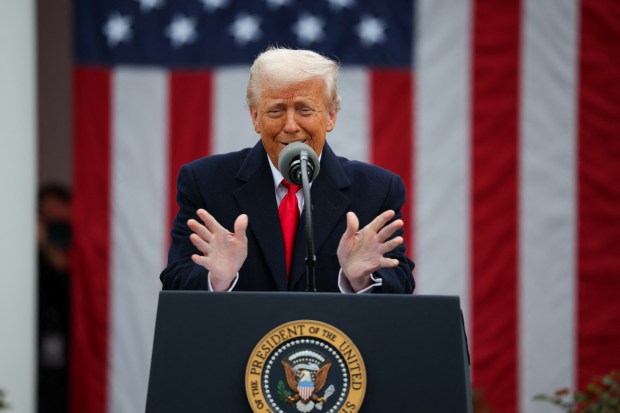
President Trump unveiled his reciprocal tariff plan on countries worldwide on April 2, which he declared as “Liberation Day.”
Reciprocal tariffs per country, which includes the 10% baseline fee:
- China: charges the US 67% tariffs, the US will counter with 34% reciprocal tariffs.
- European Union: charges the US 39% tariffs, the US will counter with 20% reciprocal tariffs.
- Vietnam: charges the US 90% tariffs, the US will counter with 46% reciprocal tariffs.
- Taiwan: charges the US 64% tariffs, the US will counter with 32% reciprocal tariffs.
- Japan: charges the US 46% tariffs, the US will counter with 24% reciprocal tariffs.
- India: charges the US 52% tariffs, the US will counter with 26% reciprocal tariffs.
- South Korea: charges the US 50% tariffs, the US will counter with 25% reciprocal tariffs.
- Thailand: charges the US 72% tariffs, the US will counter with 36% reciprocal tariffs.
- Switzerland: charges the US 61% tariffs, the US will counter with 31% reciprocal tariffs.
- Indonesia: charges the US 61% tariffs, the US will counter with 32% reciprocal tariffs.
- Malaysia: charges the US 47% tariffs, the US will counter with 24% reciprocal tariffs.
- Cambodia: charges the US 97% tariffs, the US will counter with 49% reciprocal tariffs.
- United Kingdom: charges the US 10% tariffs, the US will counter with 10% reciprocal tariffs.
- South Africa: charges the US 60% tariffs, the US will counter with 30% reciprocal tariffs.
- Brazil: charges the US 10% tariffs, the US will counter with 10% reciprocal tariffs.
- Bangladesh: charges the US 74% tariffs, the US will counter with 37% reciprocal tariffs.
- Singapore: charges the US 10% tariffs, the US will counter with 10% reciprocal tariffs.
- Israel: charges the US 33% tariffs, the US will counter with 17% reciprocal tariffs.
- Philippines: charges the US 34% tariffs, the US will counter with 17% reciprocal tariffs.
- Chile: charges the US 10% tariffs, the US will counter with 10% reciprocal tariffs.
- Australia: charges the US 10% tariffs, the US will counter with 10% reciprocal tariffs.
- Pakistan: charges the US 58% tariffs, the US will counter with 29% reciprocal tariffs.
- Turkey: charges the US 10% tariffs, the US will counter with 10% reciprocal tariffs.
- Sri Lanka: charges the US 88% tariffs, the US will counter with 44% reciprocal tariffs.
- Colombia: charges the US 10% tariffs, the US will counter with 10% reciprocal tariffs.
- Peru: charges the US 10% tariffs, the US will counter with 10% reciprocal tariffs.
- Nicaragua: charges the US 36% tariffs, the US will counter with 18% reciprocal tariffs.
- Norway: charges the US 30% tariffs, the US will counter with 15% reciprocal tariffs.
- Costa Rica: charges the US 17% tariffs, the US will counter with 10% reciprocal tariffs.
- Jordan: charges the US 40% tariffs, the US will counter with 20% reciprocal tariffs.
- Dominican Republic: charges the US 10% tariffs, the US will counter with 10% reciprocal tariffs.
- United Arab Emirates: charges the US 10% tariffs, the US will counter with 10% reciprocal tariffs.
- New Zealand: charges the US 20% tariffs, the US will counter with 10% reciprocal tariffs.
- Argentina: charges the US 10% tariffs, the US will counter with 10% reciprocal tariffs.
- Ecuador: charges the US 12% tariffs, the US will counter with 10% reciprocal tariffs.
- Guatemala: charges the US 10% tariffs, the US will counter with 10% reciprocal tariffs.
- Honduras: charges the US 10% tariffs, the US will counter with 10% reciprocal tariffs.
- Madagascar (Burma): charges the US 88% tariffs, the US will counter with 44% reciprocal tariffs.
- Tunisia: charges the US 55% tariffs, the US will counter with 28% reciprocal tariffs.
- Kazakhstan: charges the US 54% tariffs, the US will counter with 27% reciprocal tariffs.
- Serbia: charges the US 74% tariffs, the US will counter with 37% reciprocal tariffs.
- Egypt: charges the US 10% tariffs, the US will counter with 10% reciprocal tariffs.
- Saudi Arabia: charges the US 10% tariffs, the US will counter with 10% reciprocal tariffs.
- El Salvador: charges the US 10% tariffs, the US will counter with 10% reciprocal tariffs.
- Côte d’Ivoire: charges the US 41% tariffs, the US will counter with 21% reciprocal tariffs.
- Laos: charges the US 95% tariffs, the US will counter with 48% reciprocal tariffs.
- Botswana: charges the US 74% tariffs, the US will counter with 37% reciprocal tariffs.
- Trinidad and Tobago: charges the US 12% tariffs, the US will counter with 10% reciprocal tariffs.
- Morocco: charges the US 10% tariffs, the US will counter with 10% reciprocal tariffs.
- Moldova: charges the US 61% tariffs, the US will counter with 31% reciprocal tariffs.
- Angola: charges the US 63% tariffs, the US will counter with 32% reciprocal tariffs.
- Democratic Republic of the Congo: charges the US 22% tariffs, the US will counter with 11% reciprocal tariffs.
- Jamaica: charges the US 10% tariffs, the US will counter with 10% reciprocal tariffs.
- Mozambique: charges the US 31% tariffs, the US will counter with 16% reciprocal tariffs.
- Paraguay: charges the US 10% tariffs, the US will counter with 10% reciprocal tariffs.
- Zambia: charges the US 33% tariffs, the US will counter with 17% reciprocal tariffs.
- Lebanon: charges the US 10% tariffs, the US will counter with 10% reciprocal tariffs.
- Tanzania: charges the US 10% tariffs, the US will counter with 10% reciprocal tariffs.
- Iraq: charges the US 78% tariffs, the US will counter with 39% reciprocal tariffs.
- Georgia: charges the US 10% tariffs, the US will counter with 10% reciprocal tariffs.
- Senegal: charges the US 10% tariffs, the US will counter with 10% reciprocal tariffs.
- Azerbaijan:charges the US 10% tariffs, the US will counter with 10% reciprocal tariffs.
- Cameroon: charges the US 22% tariffs, the US will counter with 11% reciprocal tariffs.
- Uganda: charges the US 20% tariffs, the US will counter with 10% reciprocal tariffs.
- Albania: charges the US 10% tariffs, the US will counter with 10% reciprocal tariffs.
- Armenia: charges the US 10% tariffs, the US will counter with 10% reciprocal tariffs.
- Nepal: charges the US 10% tariffs, the US will counter with 10% reciprocal tariffs.
- Sint Maarten: charges the US 10% tariffs, the US will counter with 10% reciprocal tariffs.
- Falkland Islands: charges the US 82% tariffs, the US will counter 41% with reciprocal tariffs.
- Gabon: charges the US 10% tariffs, the US will counter with 10% reciprocal tariffs.
- Kuwait: charges the US 10% tariffs, the US will counter with 10% reciprocal tariffs.
- Togo: charges the US 10% tariffs, the US will counter with 10% reciprocal tariffs.
- Suriname: charges the US 10% tariffs, the US will counter with 10% reciprocal tariffs.
- Belize: charges the US 10% tariffs, the US will counter with 10% reciprocal tariffs.
- Algeria: charges the US 59% tariffs, the US will counter with 30% reciprocal tariffs.
- Oman: charges the US 10& tariffs, the US will counter with 10% reciprocal tariffs.
- Uruguay: charges the US 10% tariffs, the US will counter with 10% reciprocal tariffs.
- Bahamas: charges the US 10% tariffs, the US will counter with 10% reciprocal tariffs.
- Lesotho: charges the US 99% tariffs, the US will counter with 55% reciprocal tariffs.
- Ukraine: charges the US 10% tariffs, the US will counter with 10% reciprocal tariffs.
- Bahrain: charges the US 10% tariffs, the US will counter with 10% reciprocal tariffs.
- Qatar: charges the US 10% tariffs, the US will counter with 10% reciprocal tariffs.
- Mauritius: charges the US 80% tariffs, the US will counter with 40% reciprocal tariffs.
- Fiji: charges the US 63% tariffs, the US will counter with 32% reciprocal tariffs.
- Iceland: charges the US 10% tariffs, the US will counter with 10% reciprocal tariffs.
- Kenya: charges the US 10% tariffs, the US will counter with 10% reciprocal tariffs.
- Liechtenstein: charges the US 73% tariffs, the US will counter with 37% reciprocal tariffs.
- Guyana: charges the US 76% tariffs, the US will counter with 38% reciprocal tariffs.
- Haiti: charges the US 10% tariffs, the US will counter with 10% reciprocal tariffs.
- Bosnia and Herzegovina: charges the US 70% tariffs, the US will counter with 35% reciprocal tariffs.
- Nigeria: charges the US 27% tariffs, the US will counter with 14% reciprocal tariffs.
- Namibia: charges the US 42% tariffs, the US will counter with 21% reciprocal tariffs.
- Brunei: charges the US 47% tariffs, the US will counter with 24% reciprocal tariffs.
- Bolivia: charges the US 20% tariffs, the US will counter with 10% reciprocal tariffs.
- Panama: charges the US 10% tariffs, the US will counter with 10% reciprocal tariffs.
- Venezuela: charges the US 29% tariffs, the US will counter with 15% reciprocal tariffs.
- North Macedonia: charges the US 65% tariffs, the US will counter 33% with reciprocal tariffs.
- Ethiopia: charges the US 10% tariffs, the US will counter with 10% reciprocal tariffs.
- Ghana: charges the US 17% tariffs, the US will counter with 10% reciprocal tariffs.
The full list was shared on by the White House’s rapid response team on X.
